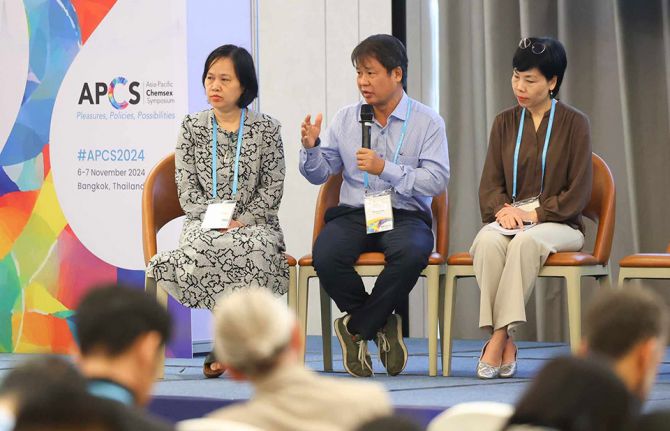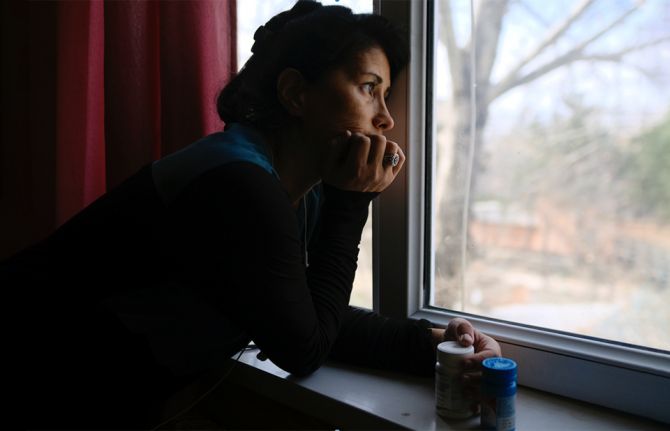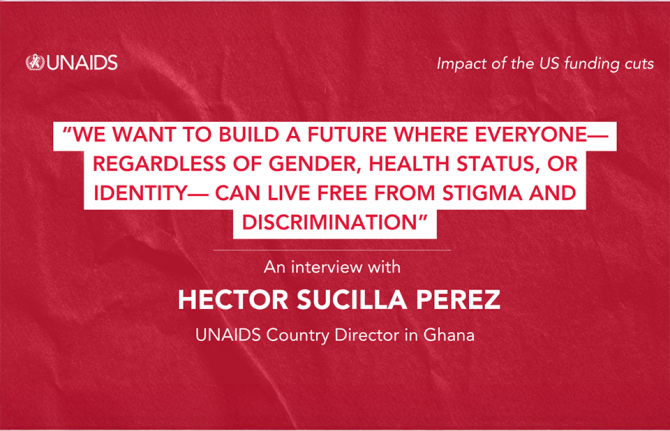
Feature Story
Punitive laws and human rights violations limit access to HIV prevention and care services for men who have sex with men and transgender people in Asia Pacific
21 July 2010
21 July 2010 21 July 2010Vienna, 21 July 2010 – Some 19 of 48 countries in the Asia Pacific region continue to criminalize male-to-male sex, and these laws frequently lead to abuse and human rights violations. Correspondingly, HIV prevalence has reached alarming levels among men who have sex with men and transgender populations in many countries of the region. If countries fail to address the legal and human rights context of HIV, this already critical situation is likely to become worse. The implementation of effective, national HIV responses requires governments to consider and address the effects of laws and law enforcement practices on the health of men who have sex with men and transgender people.
This warning came as a key finding in the report entitled Legal environments, human rights and HIV responses among men who have sex with men and transgender people in Asia and the Pacific: An agenda for action.
Commissioned by the United Nations Development Programme (UNDP) and the Asia Pacific Coalition on Male Sexual Health (APCOM), this report and its key findings were presented during the session on Criminalizing Homosexual Behavior: Human Rights Violation and Obstacles to Effective HIV/AIDS Prevention at the XVIII International AIDS Conference in Vienna.
The study found that a range of laws, such as public order and vagrancy offences, are selectively enforced against men who have sex with men and transgender people in many countries of the region. Even in the absence of criminalization, the arbitrary and inappropriate enforcement of other legal provisions often violate the rights of men who have sex with men and transgender persons, thereby obstructing advocacy, outreach, and delivery of HIV and health services. The issue of effective access to HIV services was at the heart of the 2009 landmark ruling by the Delhi High Court that Section 377 of the Indian Penal Code unfairly discriminates against men who have sex with men.
The existence of punitive laws across the Asia Pacific Region along with selective, discriminatory enforcement practices continues to reduce the effectiveness of national HIV responses. According to Jeff O’Malley, Director of UNDP’s HIV Practice, “repressive legal environments institutionalize discrimination, limit funding and in effect obstruct the participation of men who have sex with men and transgender people in protecting themselves and their families, friends and communities from HIV. In the context of HIV and in the context of human rights, we must continue to vigorously defend and promote rights based HIV, health and development policies and programme responses – this necessitates working to remove punitive laws and discriminatory practices.”
The study highlighted that there are some recent examples of protective laws, judicial and policy actions to improve the legal environment for men who have sex with men and transgender people, including important court judgments in Nepal, India, Pakistan, Philippines, Fiji, South Korea and Hong Kong SAR. However, these are exceptional developments and action is required to improve the legal environment in all countries.
“There is a way forward towards ensuring that all citizens of a country, irrespective of their sexual orientation or gender identity can access health services to prevent unnecessary infection,” said Shivananda Khan, Chair of APCOM. “Developing strategic partnerships and alliances between affected communities, the legal profession, human rights bodies, parliamentarians, policy makers and the media is critical.”
Many national HIV policies now accord a priority to men who have sex with men, even though the legal environment remains repressive. Some 22 national HIV responses in the Asia and Pacific region have identified men who have sex with men as a priority population for the purposes of HIV prevention and four countries have specific strategic plans or action plans on men who have sex with men and HIV (Cambodia, China, Indonesia and India). Furthermore, the Global Fund to Fight AIDS, Tuberculosis and Malaria is funding a regional multi-country programme in South Asia on men who have sex with men and HIV, which has been endorsed by seven South Asian countries.
The report is available for download at: http://regionalcentrebangkok.undp.or.th/practices/hivaids
Right Hand Content
Cosponsors:
Contact:
In Vienna:
Zoran Stevanovic
Bratislava
Regional Communications Advisor UNDP, Europe and the CIS
tel. +421 2 59337 428,
mob. +421 908 729 846
zoran.stevanovic@undp.org
Dr. Mandeep Dhaliwal
New York
Cluster Leader: Human Rights, Gender and Sexual Diversities Cluster, UNDP
tel. +1 646 642 4612
mandeep.dhaliwal@undp.org
In Bangkok:
Edmund Settle
Bangkok
HIV Policy Specialist, Asia Pacific Regional Center UNDP
tel. +66 (0) 818369300
edmund.settle@undp.org
Publications:
UNAIDS Outlook Report 2010 (pdf, 6 Mb)
UNAIDS Outcome Framework 2009-2011 (pdf, 388 Kb)
Related

Feature Story
Rights Here, Rights Now! The Global Commission on HIV and the Law
19 July 2010
19 July 2010 19 July 2010
Legal frameworks can be powerful tools for countries struggling to control their epidemics. The last three decades have given rise to contentious legal debates on HIV-related issues (e.g.: criminalization of HIV transmission; legal restrictions on needle and syringe distribution in the US, on methadone in Russia, versus legal comprehensive harm reduction in Australia). The last few years have seen an insurgence of punitive laws and practices related to drug use, HIV transmission and exposure, sex work, and same sex sexual relations. There is also a growing body of evidence on the relationship between HIV and violence against women.
There is enough variation in legal responses to HIV around the world to highlight the need to rigorously examine the impact of different legal environments on HIV outcomes and to make appropriate recommendations. According to Jeffrey O’Malley, Director of the United Nations Development Programme’s HIV/AIDS Practice, “Thirty years on, there is a huge variation from one country to the next in terms of HIV prevention results. It is increasingly clear that one of the most influential factors is the legal environment. Does the law facilitate and enable HIV prevention and care or does it stand in the way? We need to understand both cases and to promote good practice.”
Right here, right now is the time to take a hard look at how legal environments affect HIV responses. As highlighted in the Vienna Declaration, the relationship between legal environments and epidemiological trends in Eastern Europe offers an example of the ways in which legal frameworks can impact HIV epidemics. The Global Commission on HIV and the Law “provides a timely opportunity to take stock of the impact of punitive laws and practices on the lives of those most marginalized in our societies and on their access to life-saving HIV prevention and treatment services. For this reason, Australia is pleased to be supporting this endeavour. We hope other donors will follow suit,” says Mr. Murray Proctor, Australia’s AIDS Ambassador.
The Global Commission on HIV and the Law will explore the impacts of legal environments on HIV responses. Areas of inquiry may include: (1) punitive laws and practices that effectively criminalise lives (2) laws and practices that sustain violence and discrimination as lived by women (3) laws and practices that impede treatment access. The Commission’s work will take place over an 18 month period –mobilizing communities across the globe and promoting public dialogue on how to make the law work for an effective response to HIV. The findings and recommendations of the Commission will be announced in December 2011.
The Commission, which brings together eminent leaders from many walks of life and regions, will interrogate the legal environments that form the context of national HIV responses. Experts on law, public health, human rights, and HIV will support the Commissions’ work. Commissioners will assess evidence about the impact of law and law enforcement on the lives of people living with HIV and those most vulnerable to it. Regional dialogues will provide a space in which those most directly affected by HIV-related laws can share their experiences with policy and law makers. As noted by Commissioner H.E. Festus Mogae, former President of Botswana, “HIV threatens us all. HIV is a global problem and the promise of an AIDS-free generation requires bold global leadership. This Commission is an important expression of the commitment and leadership of the global community to meet the needs most vulnerable to HIV.”
Right Hand Content
External links:
Global Commission on HIV and the Law
Publications:
Information note: Global Commission on HIV and the Law 2010
Biographies of the Commissioners
Technical Advisory Group Biographies
UNAIDS Outlook Report 2010 (pdf, 6 Mb)
UNAIDS Outcome Framework 2009-2011 (pdf, 388 Kb)
Related

Feature Story
A human rights-based approach to prevention: Mission impossible?
19 July 2010
19 July 2010 19 July 2010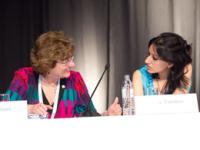 From the left: Mirta Roses; Tripti Tandon at ‘Human Rights based approach to HIV Prevention: Mission Impossible’, 18 July 2010. Credit: UNAIDS/Anna Rauchenberger
From the left: Mirta Roses; Tripti Tandon at ‘Human Rights based approach to HIV Prevention: Mission Impossible’, 18 July 2010. Credit: UNAIDS/Anna RauchenbergerThe Global Village of AIDS 2010 was the setting of a UNAIDS satellite session on HIV prevention and human rights. Participants discussed how evidence-informed and rights-based laws, policies and programmes can be scaled-up in support of a ‘prevention revolution’ to break the trajectory of the epidemic.
Panelists highlighted some enduring failures to recognise and protect human rights in the context of prevention, as well as examples of successful prevention responses employing a human rights-based approach. Notwithstanding some key challenges, the unanimous view of the diverse expert panel was that such an approach to prevention is not mission impossible if current opportunities to put human rights at the centre of the prevention revolution are seized. Indeed, it was felt that there can be no ‘revolution’ of the prevention response without human rights.
The event, which used a talk show format to encourage open dialogue and audience participation, was moderated by Dr Mandeep Dhaliwal, Cluster Leader of Human Rights, Gender and Sexual Diversity at the United Nations Development Programme (UNDP).
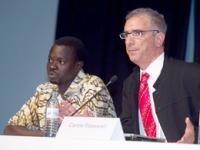 From the left: Daouda Diouf; Carlos Passarelli at ‘Human Rights based approach to HIV Prevention: Mission Impossible’, 18 July 2010.
From the left: Daouda Diouf; Carlos Passarelli at ‘Human Rights based approach to HIV Prevention: Mission Impossible’, 18 July 2010.Credit: UNAIDS/Anna Rauchenberger
Six panelists from a range of perspectives and experiences including governments, civil society and the United Nations, presented their views on whether human rights have been used effectively to drive action towards universal access to HIV prevention, treatment, care and support.
Mr Carlos Passarelli of the Government of Brazil spoke about his country’s experience and success in HIV prevention which, he said would not have occurred without a human rights-based approach.
Speaking from first-hand knowledge, Ms Olimbi Hoxhaj of the Albanian Network of People Living with HIV, told the session about her experience in using arguments based on human rights and equality in order to get her children into school and gain access to treatment for those who were HIV-positive.
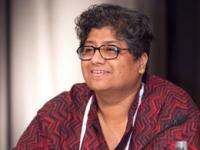 Meena Seshu at ‘Human Rights based approach to HIV Prevention: Mission Impossible’, 18 July 2010.
Meena Seshu at ‘Human Rights based approach to HIV Prevention: Mission Impossible’, 18 July 2010.Credit: UNAIDS/Anna Rauchenberger
Ms Meena Seshu described how female, male and transgender sex workers’ access to health and HIV prevention was being undermined by the fact that their rights to the highest standards of health and to safe working conditions were not being protected. Ms Seshu is a member of SANGRAM, an Indian grass-roots peer education organisation partnering with women in sex work to promote their rights and encourage them to be agents of change.
Other panelists included Tripti Tandon from the Lawyers’ Collective in India, Dr Mirta Roses, Director of the Pan American Health Organisation, PAHO and Daouda Diouf of the international NGO Enda Sante.
A human rights-based approach to mitigating the extent and effects of the AIDS epidemic, and promoting universal access to HIV services is seen as critical. Although there has been notable progress in many areas, punitive laws, policies, practices and stigma and discrimination continue to undermine the achievement of universal access targets including access to prevention for those who need it – and the Millennium Development Goals.
Panelists emphasized that a prevention revolution must be grounded in human rights if there is to be a significant and sustainable improvement in the prevention response. In summing up the discussion at the Satellite, Mandeep Dhaliwal noted that the experiences shared confirmed that success in prevention can only be achieved in legal and social environments that advance human rights, gender equality and social justice.
She emphasised the importance of the UNAIDS High Level Commission on HIV Prevention putting the issue of human rights – for so long poorly understood and neglected in the prevention response - at the front and centre of its work. “After all, what good is a prevention revolution without human rights?”
Right Hand Content


Cosponsors:
United Nations Development Programme (UNDP)
Partners:
Pan American Health Organisation (PAHO)
Feature stories:
Landmark forum in China to champion rights-based approach to HIV (06 July 2010)
UNAIDS addresses UN Human Rights Council on the impact of punitive laws on HIV (10 June 2010)
Publications:
UNAIDS Outlook Report 2010 (pdf, 6 Mb)
UNAIDS Outcome Framework 2009-2011 (pdf, 388 Kb)
Related

Feature Story
Punitive laws limit access to HIV prevention and care services in Asia Pacific
24 May 2010
24 May 2010 24 May 2010This story was first published on UNDP.org
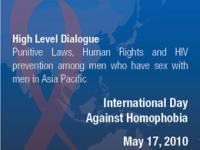
More than 90 per cent of men having sex with men (MSM) in the Asia-Pacific region do not have access to HIV prevention and care services due to an adverse legal and social environment. If countries fail to address the legal context of the epidemic, this already critical situation is likely to become worse. The implementation of effective, human rights-based national HIV responses requires governments to consider the effect of laws and law enforcement practices on the health of men who have sex with men (MSM) and transgender persons.
A high-level forum on punitive laws, human rights and HIV prevention among MSM in the Asia-Pacific region was convened by the UN Development Programme (UNDP), the Asia Pacific Coalition on Male Sexual Health (APCOM) and the Centre for Comparative and Public Law (CCPL) at the University of Hong Kong. They were reviewing the findings of an upcoming report.
The study, “Laws affecting HIV responses among men who have sex with men and transgender persons in Asia and the Pacific: an agenda for action,” notes 19 of 48 countries in the region criminalize sex between men, with laws often taking on the force of vigilantism leading to abuse and human rights violations. Of the 192 member states of the United Nations, 85 have laws that still criminalize homosexual behaviour and, in some of these countries, conviction can even result in the death penalty.
On the occasion of International Day Against Homophobia, UNAIDS Executive Director Michel Sidibé said, “I salute the dedication and efforts of lesbian, gay, bisexual and transgender communities to demand their rights. Change is happening from exclusion to inclusion, from stigma to dignity but not everywhere ... I call on all governments to create to create social and legal environments that ensure respect for human rights.”
I call on all governments to create to create social and legal environments that ensure respect for human rights
UNAIDS Executive Director Michel Sidibé
At the gathering in Hong Kong, Mandeep Dhaliwal, UNDP Cluster Leader on Human Rights, Gender and Sexual Diversity, said, “The development and strengthening of an enabling legal and social environment is critical for comprehensive interventions for men who have sex with men and transgender people to have the greatest impact.”
At least 5–10% of all HIV infections worldwide are due to sexual transmission between men, though this figure varies within countries and between regions considerably. In Asia, men who have sex with men are disproportionately affected by HIV. It is estimated that HIV prevalence is as high as 14% in Phnom Penh, Cambodia; 16% in Andrha Pradesh, India; and 28% in Bangkok, Thailand.
Men who have unprotected sex with men may also have unprotected sex with women and thus serve as an epidemiological bridge for the virus to the broader population. For example, a survey of over 800 men in China who have sex with men found that 59% reported having had unprotected sex with women in the previous year.
HIV transmission prevention programmes addressing men who have sex with men are therefore vitally important. However, this population is often seriously neglected because of official denial by governments, the relative invisibility of men who have sex with men, stigmatization, ignorance or lack of adequate information.
In some cases, men who have sex with men are neglected due to reluctance by individuals and organizations to work with them. In many countries, prevention efforts are hindered by laws that criminalize male-male sex, making work with men who have sex with men difficult and hindering their contribution to the response to the epidemic.
Even in the absence of criminalization, other provisions of law often violate the rights of those concerned, thereby obstructing HIV interventions, advocacy and outreach, and service delivery. Moreover, legislation and law enforcement often lag behind national HIV policies, undermining the reach and effectiveness of programmes for men who have sex with men.
This indicates the need for greater coordination between health and justice sectors within government, the report stresses. It highlighted some recent examples of protective laws, judicial and policy actions to improve the legal environment for the men concerned, including important court judgments in Fiji, India, Hong Kong, Nepal, Pakistan, Philippines and the Republic of Korea.
But these are exceptional developments and action is required to improve the legal environment in all countries, it warned.
The final report of the study’s findings will be delivered at the XVIII International AIDS Conference, Vienna, at the session on Criminalizing Homosexual Behaviour: Human Rights Violation and Obstacles to Effective HIV/AIDS Prevention, 20 July 2010.
Punitive laws limit access to HIV prevention and
Key populations:
Cosponsors:
United Nations Development Programme (UNDP)
Multimedia:
Video message from UNAIDS Executive Director
Feature stories:
International Day Against Homophobia (17 May 2010)
China to tackle HIV incidence amongst MSM (16 January 2009)
Focused AIDS programmes in Asia and the Pacific (21 March 2007)
External links:
Asia Pacific Coalition on Male Sexual Health
Centre for Comparative and Public Law
Publications:
HIV and Men who have Sex with Men in Asia and the Pacific (pdf, 1.1 Mb.)
AIDS Epidemic Update 2009 (pdf, 2.90 Mb.)

Feature Story
UNDP’s Administrator Helen Clark concludes four-country Africa tour
21 May 2010
21 May 2010 21 May 2010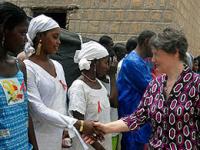
Helen Clark meets with beneficiaries of an HIV project in Timbuktu. 04 May 2010. Credit: UNDP
The Administrator of the United Nations Development Programme (UNDP) Helen Clark recently ended a four-country tour of Africa to highlight progress towards the Millennium Development Goals (MDGs) in the run-up to the MDGs Summit in September 2010. Ms Clark travelled to Mali, Burkina Faso, Tanzania, and South Africa.
“Achieving the MDGs means quite simply a better life for billions of people,” Helen Clark said. “...Reaching the Millennium Development Goals is possible, and there is a range of tried and tested policies which ensure progress, particularly when backed by strong partnerships.”
UNAIDS participated in one leg of the tour as part of a joint mission with UNDP. UNAIDS Executive Director Michel Sidibé accompanied Ms Clark to Mali on a four-day mission where he reiterated his call for preventing HIV transmission from mothers to children. "I am honoured to join Helen Clark on her first visit to Mali, which is a clear sign of the UN's commitment to reach zero new HIV infections," Mr Sidibé said.
Ms Clark met with Heads of State and Ministers, touched base with women leaders and members of civil society, and visited development projects.
Mali has been making important headway in tackling the AIDS epidemic, having reduced national prevalence from 1.7% in 2001 to 1.3% in 2006 and dramatically expanding universal access to HIV services.
Ms Clark also reiterated the importance of empowering women to achieving the Millennium Development Goals, describing “economic empowerment, access to legal rights, including inheritance rights, and participation in decision-making” as key steps toward achieving women’s empowerment.
In Burkina Faso, she toured a project which facilitates access to energy for rural women, and visited one of 176 UNDP-supported AIDS community associations where she spoke with sex workers about their concerns for the future.
The prevalence rate of HIV in Burkina Faso has dropped from 7% in 2002 to 1.6% in 2008, one of the lowest in West Africa. Despite this progress, the country still faces an epidemic mostly affecting women between 15 and 24 years old.
In Tanzania, Ms Clark met with the Minister for Finance and Economic Affairs, Mustafa Mkulo, to discuss the country’s progress towards the MDGs, particularly on the AIDS response, empowering women, and enrolling children in primary school. She also travelled to Zanzibar and visited the Jozani-Chwaka Bay Conservation Area, the single most important site for the conservation of the island’s biodiversity.
Ms Clark toured the National Electoral Commission’s voter registration facilities where she spoke to first-time voters planning to take part in the national elections this October. UNDP’s support to Tanzania’s election process includes voter education, training for media and political parties, and training domestic observers.
In the last leg of her Africa tour Ms Clark visited South Africa, where she launched an MDGs campaign song in Johannesburg for the 2010 FIFA World Cup, "8 Goals for Africa". The song encourages commitment to the achievement of the MDGs.
“There can be no spectators in the fight against poverty,” she said at the launch. “Everyone has a role to play in scoring the 8 Millennium Development Goals, which if reached would improve the quality of life for hundreds of millions of people across developing countries.”
Ms Clark ended her four-country tour of Africa by launching the second annual Picture This photo contest in Johannesburg in partnership with Olympus Corporation and the Agence France-Presse (AFP) Foundation. The contest, titled Picture This: We Can End Poverty, seeks to show the inspirational work that is being done in many countries to achieve the MDGs.
“Through the photo contest this year we want to show that the MDGs can be reached, even in the poorest and most disadvantaged countries,” Ms Clark concluded.
UNDP’s Administrator Helen Clark concludes four-c
Cosponsors:
Multimedia:
Photo gallery - Joint mission by UNDP and UNAIDS to Mali
Feature stories:
First joint mission by UNDP and UNAIDS to Mali (4 May 2010)
Joint Mission to Mali Concludes (6 May 2010)

Feature Story
Joint Mission to Mali Concludes
06 May 2010
06 May 2010 06 May 2010 (L to R) UNDP Administrator Helen Clark, UNAIDS Executive Director Michel Sidibé, President of Mali Amadou Toumani Touré. 4 May 2010. Credit: UNDP
(L to R) UNDP Administrator Helen Clark, UNAIDS Executive Director Michel Sidibé, President of Mali Amadou Toumani Touré. 4 May 2010. Credit: UNDPOn the fourth and final day of their official visit to Mali, UNDP Administrator Helen Clark and UNAIDS Executive Director Michel Sidibé commended President Amadou Toumani Touré on achievements in the country’s AIDS response and said that Mali had set an example for other countries in the region to follow.
According to government estimates, about 27 000 people were receiving antiretroviral treatment in 2009, representing more than 80% of those in need. HIV prevalence in Mali declined from about 1.7% in 2001 to 1.3 % in 2006.
“I want to congratulate President Touré for leading Mali's success in the national AIDS response," said Ms Clark, in a meeting with the Malian Head of State. "These results are remarkable.”
Mr Touré, who has served as President since 2002, is Chair of Mali’s National AIDS Committee, an organization that coordinates the country’s AIDS programme. He said the Committee had succeeded in uniting all sectors in the country, including all levels of government and civil society. However, he underscored the importance of remaining vigilant in the national HIV response: “AIDS is like a boxing match. We can never let down our guard,” he said.
Mali needs to build on its success by redoubling efforts to ensure an HIV-free generation.
UNAIDS Executive Director Michel Sidibé
During the visit, Mr Sidibé reiterated his call for the elimination of mother-to-child transmission of HIV: “Mali needs to build on its success by redoubling efforts to ensure an HIV-free generation.” An estimated 12% of pregnant women in Mali received an HIV test in 2008 and, that same year, only 18% of infants born to HIV-positive women were given ARV prophylaxis to prevent mother-to-child transmission.
Ms Clark and Mr Sidibé began their mission in the ancient city of Timbuktu, where they visited Groupe d'Appui à la Formation de Base (GAFB), a local civil society organization that provides HIV prevention through innovative peer education programmes among vulnerable populations, including uniformed services, youth, and domestic workers.
“Twenty years ago when I was Minister of Health in my own county, we had the same chance that you have today in this region to stop the epidemic in its tracks,” said Ms Clark, a native of New Zealand. “We were successful because we had a very inclusive approach. Mali should be the example for other countries in Africa on how to halt the HIV epidemic."
GAFB is working to give people a voice and help the most marginalized members of society, said Mr Sidibé. "This organization is showing that we can end the HIV epidemic by focusing on those that are most vulnerable," he added.
GAFB started its activities with the support of a World Bank grant, and continues to expand its services through resources from the Global Fund. In January 2010, the Global Fund awarded Mali a two-year grant of US $43 million to intensify HIV prevention, treatment, care and support across the country.
Joint Mission to Mali Concludes
Cosponsors:
Multimedia:
Feature stories:
UNDP and UNAIDS joint mission to Mali continues (03 May 2010)
First joint mission by UNDP and UNAIDS to Mali (01 May 2010)

Feature Story
UNDP and UNAIDS joint mission to Mali continues
03 May 2010
03 May 2010 03 May 2010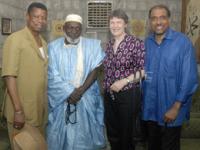 (L to R): Malik Sène, Executive Secretary of NAC, Ben Essayouti, Imam of Timbuktu, UNDP Administrator Helen Clark and UNAIDS Executive Director Michel Sidibé
(L to R): Malik Sène, Executive Secretary of NAC, Ben Essayouti, Imam of Timbuktu, UNDP Administrator Helen Clark and UNAIDS Executive Director Michel SidibéUNDP Administrator Helen Clark and UNAIDS Executive Director Michel Sidibé began their four-day mission to Mali in the ancient city of Timbuktu, where they visited Groupe d'Appui à la Formation de Base (GAFB), a local civil society organization that provides HIV prevention through innovative peer education programmes among vulnerable populations, including uniformed services, youth, and domestic workers.
“Twenty years ago when I was Minister of Health in my own county, we had the same chance that you have today in this region to stop the epidemic in its tracks,” said Ms Clark, a native of New Zealand. “We were successful because we had a very inclusive approach. Mali should be the example for other countries in Africa on how to halt the HIV epidemic."
This organization is showing that we can end the HIV epidemic by focusing on those that are most vulnerable.
UNAIDS Executive Director Michel Sidibé
Accompanying Helen Clark, Michel Sidibé said that GAFB is working to give people a voice and help the most marginalized members of society. "This organization is showing that we can end the HIV epidemic by focusing on those that are most vulnerable," said Mr Sidibé. "I am honoured to join Helen Clark on her first visit to Mali, which is a clear sign of the UN's commitment to reach zero new HIV infections.”
GAFB started its activities with the support of a World Bank grant, and continues to expand its services through resources from the Global Fund. Earlier this year, the Global Fund awarded Mali a two-year grant of US $43 million to intensify HIV prevention, treatment, care and support across the country.
In meetings with high-level government officials on May 3-4, including President Amadou Toumani Touré, the executive heads of UNDP and UNAIDS will call for an accelerated national AIDS response in the lead-up to 2015, the target date set by the international community for reaching the Millennium Development Goals. Mr Sidibé will also reiterate his call for the elimination of mother-to-child transmission of HIV. An estimated 12% of pregnant women in Mali received an HIV test in 2008 and, that same year, only 18% of infants born to HIV-positive women were given antiretrovirals to prevent HIV infection.
According to government estimates, Mali’s HIV prevalence declined from 1.7% in 2001 to 1.3 % in 2006 and about 27 000 people were receiving antiretroviral treatment in 2009, representing more than 80% of those in need. UNAIDS estimates that 100 000 people are currently living with HIV in Mali.
UNDP and UNAIDS joint mission to Mali continues
Cosponsors:
Multimedia:
Feature stories:
First joint mission by UNDP and UNAIDS to Mali (01 May 2010)

Feature Story
First joint mission by UNDP and UNAIDS to Mali
01 May 2010
01 May 2010 01 May 2010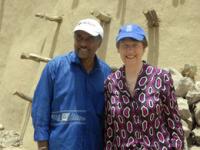
UNAIDS Executive Director Michel Sidibé and Administrator of the United Nations Development Programme (UNDP) Helen Clark during their joint mission to Mali. 01 May 2010. Credit: UNAIDS
The Administrator of the United Nations Development Programme (UNDP) Helen Clark and Executive Director of UNAIDS Michel Sidibé are on a four day mission to Mali. It is the first joint mission to Mali by these two UN agencies. Ms Clark, who is also Chair of the United Nations Development Group and Chair of the UNAIDS Committee of Cosponsoring Organizations (CCO) will call for an accelerated national AIDS response in the lead-up to 2015, the target date set by the international community for reaching the Millennium Development Goals.
The official visit will include a visit to a hospital in Timbuktu, where Ms Clark and Mr Sidibé will meet health care providers, civil society, people living with HIV and other stakeholders involved in the HIV response.
They are also scheduled to meet a number of high-level government officials, including Prime Minister Modibo Sidibé and President Amadou Toumani Touré.
Mr Sidibé will reiterate his call for preventing HIV transmission from mothers to children. Only 12% of pregnant women in Mali received an HIV test in 2008 and, that same year, 18% of infants born to HIV-positive women were given antiretrovirals to prevent HIV infection.
Earlier this year the Global Fund awarded a grant of US$ 43 million to Mail towards reaching universal access to HIV prevention, treatment, care and support.
In recent years, Mali has made considerable progress in expanding HIV prevention, treatment care and support for those in need. According to government estimates Mali’s HIV prevalence has declined from 1.7% in 2001 to 1.3 % in 2006 and in 2009 80% of people who need treatment (over 27,000) were on antiretroviral treatment. UNAIDS estimates that 100 000 people are currently living with HIV in Mali.
First joint mission by UNDP and UNAIDS to Mali
Cosponsors:

Feature Story
UNDP to partner with Sony and JICA in Cameroon and Ghana during FIFA World Cup
30 March 2010
30 March 2010 30 March 2010
Group photo of JICA, SONY and UNDP directors with the Ambassadors of Ghana and Cameroon in Japan
Sony Corporation is partnering with the United Nations Development Programme (UNDP) and the Japan International Cooperation Agency (JICA) to bring health information, with a special focus on HIV, to vulnerable communities in Cameroon and Ghana.
This summer, Sony will set up large screens to live broadcast, for free, approximately 20 FIFA World Cup matches, allowing people in areas where TVs are scarce. Throughout the games, UNDP, JICA and local partners will also be offering viewers HIV counselling and advocacy material as part of their AIDS-awareness campaign called “Public Viewing in Africa”. Both countries’ national football teams will be participating in the World Cup, to be held in South Africa this June and July.
Although football is the most popular and closely followed sport in Cameroon and Ghana, the countries are characterised by low rates of household TV penetration (22 percent in Cameroon, and 21 percent in Ghana) with many people unable to watch football matches on TV and support their home country.
By conducting the joint project during the World Cup, one of the biggest sporting event of the year, the partners aim to attract some 13,000 participants and estimate to provide HIV testing and counselling to around 1,800 recipients.
I am in full support of this framework that provides us with tools for a more professional approach in our work with the vulnerable groups in the community.
UNDP Administrator Helen Clark
“The World Cup brings people together, both as teams, and as nations cheering on their players. The same can be true for the Millennium Development Goals,” said UNDP Administrator Helen Clark. “There can be no spectators in the fight against poverty. Everyone has a role to play in scoring the 8 Millennium Development Goals, which if reached would improve the quality of life for many hundreds of millions of people across developing countries.”
Stopping the rise of AIDS, malaria and other diseases is one of eight key Millennium Development Goals (MDGs) UN member nations are striving to achieve within the next five years. The other goals are to eradicate extreme poverty and hunger; to establish universal primary education; to promote gender equality; to reduce child mortality; to improve maternal health; to ensure environmental sustainability and to develop a global partnership for development.
“I am delighted that Sony can contribute to the prevention of HIV through our partnership with JICA and UNDP, while also delivering great football experiences to the people of Cameroon and Ghana through our cutting-edge technology and sponsorship of the 2010 FIFA World Cup,” said Howard Stringer, Chairman, CEO and President of Sony Corporation.
JICA and Sony conducted a similar joint project in Ghana in July 2009, and it was deemed a great success. Some 9,000 people gathered in seven cities to watch Sony's high-definition broadcasts of football matches, around three times the typical attendance. About 1,100 young people and adults visited the HIV testing sites and took the test and received counselling —again about three times as many people as usual.
UNDP to partner with Sony and JICA in Cameroon an
Cosponsors:
Feature stories:
UNAIDS and Private sector meet to explore collaboration towards virtual elimination of mother-to-child transmission (16 March 2010)
Footballers unite against AIDS (09 December 2009)
Private sector in West and Central Africa explore strategic partnerships for improved health outcomes (27 October 2009)
United for UNICEF: Manchester United visit highlights HIV and rights of vulnerable children (27 August 2009)
Contact:
Sony Corporation Corporate Communications:
Ikuma Nakagawa, Tel: +81-3-6748-2200, sony.pressroom@sony.co.jp
JICA, Office of Media and Public Relations:
Makiko Mitamura, Tel: +81-3-5226-9781, Mitamura.Makiko@jica.go.jp
UNDP Tokyo:
Toshiya Nishigori, Tel: +81-3-5467-4751, toshiya.nishigori@undp.org
UNDP New York:
Sandra Macharia, Tel: +1 212 906 5377, sandra.macharia@undp.org
External links:
Publications:
Joint action for results: UNAIDS outcome framework, 2009 – 2011 (pdf, 915 Kb.).

Feature Story
UNAIDS, Annie Lennox, launch action framework for women, girls and HIV
02 March 2010
02 March 2010 02 March 2010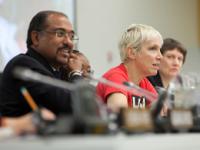
(from left) Michel Sidibé, UNAIDS Executive Director; Annie Lennox, artist and political and social activist; Helen Clark, UNDP Administrator. NY, 2 March 2010
Credit: UNAIDS/B. Hamilton
Globally, women and girls continue to be affected disproportionately by HIV. AIDS related illness is the leading cause of death and disease among women of reproductive age (15-49 years) worldwide. In sub-Saharan Africa as a whole, women account for approximately 60% of estimated HIV infections. The proportion of women to men living with HIV in Asia rose from 19% in 2000 to 35% in 2008.
UNAIDS Executive Director Mr Michel Sidibé and artist and political and social activist Annie Lennox launched the Agenda for Accelerated Country Action to bring global political attention to the well-being of women and girls today at the United Nations in New York. Today the 15-year review of the implementation of the Beijing declaration and Platform for Action opened at the Commission of the Status of Women.

Annie Lennox, artist and political and social activist addresses the launch of the action framework for women, girls and HIV. NY, 2 March 2010
Credit: UNAIDS/B. Hamilton
Ending violence against women is one of the key priority areas of UNAIDS. Up to 70% of women experience violence in their lifetime–in South Africa a woman is raped every minute.
The launch, moderated by Mr Sidibé, took the form of a dialogue, involving approximately 300 representatives from governments, civil society, and networks of women living with HIV, and women’s rights advocates and activists.
“The brutality faced by many women and girls goes far beyond social policy issues; in essence it is about equality and justice – it must become a foreign policy issue. This Agenda for Accelerated Country Action for women and girls is a path to open dialogue with leaders of countries on how we shape the world of tomorrow,” Mr Sidibé said when opening the floor for discussions.
We know that gender inequality puts millions of women and girls across the globe at greater risk of HIV infection.
Annie Lennox
Annie Lennox called for a broad movement for change saying that AIDS responses should address the rights of women and girls and must challenge gender roles to successfully stop the AIDS epidemic.
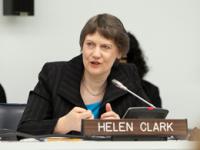
Helen Clark, UNDP Administrator. NY, 2 March 2010
Credit: UNAIDS/B. Hamilton
The Agenda for Accelerated Country Action aims to tie the women’s human rights movement with the global AIDS response and mobilize all constituencies, starting with UNAIDS and the United Nations Development Fund for Women, through increased political commitment, stronger capacity and increased resources.
This Agenda for Accelerated Country Action for women and girls is a path to open dialogue with leaders of countries on how we shape the world of tomorrow.
Michel Sidibé, UNAIDS Executive Director
“We know the facts,” Ms Lennox said, “we know that gender inequality puts millions of women and girls across the globe at greater risk of HIV infection. It is unacceptable that only 38% of young women have accurate, comprehensive knowledge of HIV.”
Mr Sidibé asked Ms Lennox how music and culture can play a role in inspiring positive change in societal practices that currently undermine the health of women and girls and violate their rights.
“I’m using my voice to call on leaders—in political, religious and business spheres—and communities to change the power imbalances between men and women, for a better world,” Ms Lennox replied.
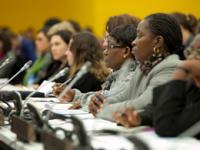
The launch involved approximately 300 representatives from governments, civil society, and networks of women living with HIV, and women’s rights advocates and activists.
Credit: UNAIDS/B. Hamilton
The Agenda for Accelerated Country Action was developed in response to the pressing need to address the persistent gender inequality and human rights violations that affect women and girls specifically. It outlines the need to understand and respond to the particular effects of the HIV epidemic on women and girls and translate political commitments into scaled-up action.
Importantly the Agenda advocates for men to work side by side with women for gender equality, challenging ideals of masculinity that lead to increased risk-taking and sanction violence against women and girls.
The Joint United Nations, which works in countries, will now begin a dialogue with civil society, including networks of women living with HIV and women’s groups, government and development partners to identify opportunities together to step up the response.
UNAIDS, Annie Lennox, launch action framework for
Press centre:
UNAIDS takes action to empower women and girls to protect themselves from HIV (02 March 2010)
Statement by UNAIDS and UNIFEM to the 54th session of the Commission on the Status of Women (11 MArch 2010)
Multimedia:
Watch press conference
Photo gallery
Feature stories:
Violence against women and HIV (10 Nov 2009)
WHO report on the health of women: AIDS leading cause of death globally in women of reproductive age (09 Nov 2009)
Publications:
Agenda for accelerated country action for women, girls, gender equality and HIV (pdf, 676 Kb.)
Community Brief for the Agenda for accelerated country action for women, girls, gender equality and HIV (pdf, 125 Kb.)


